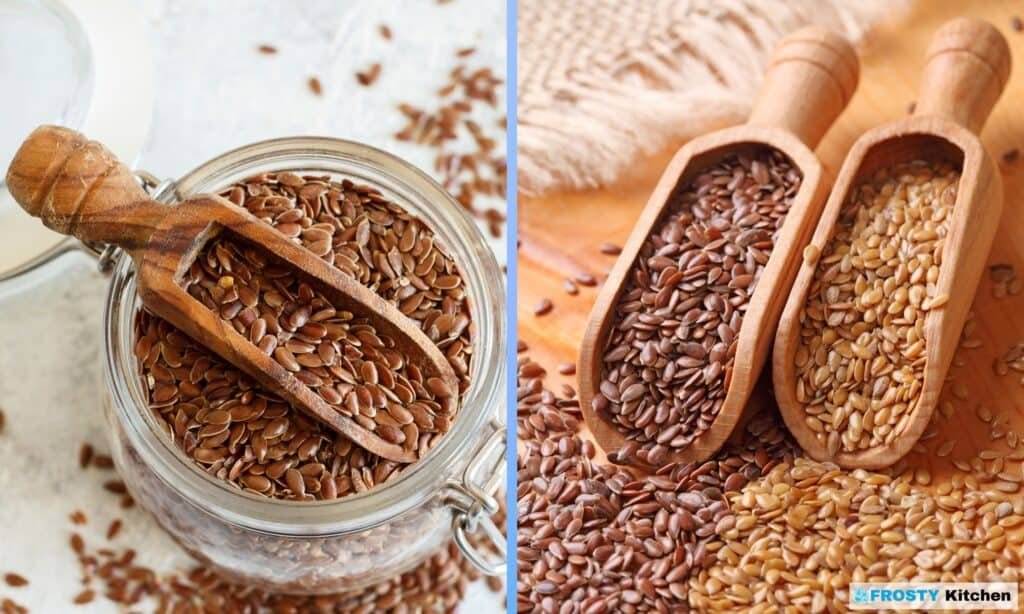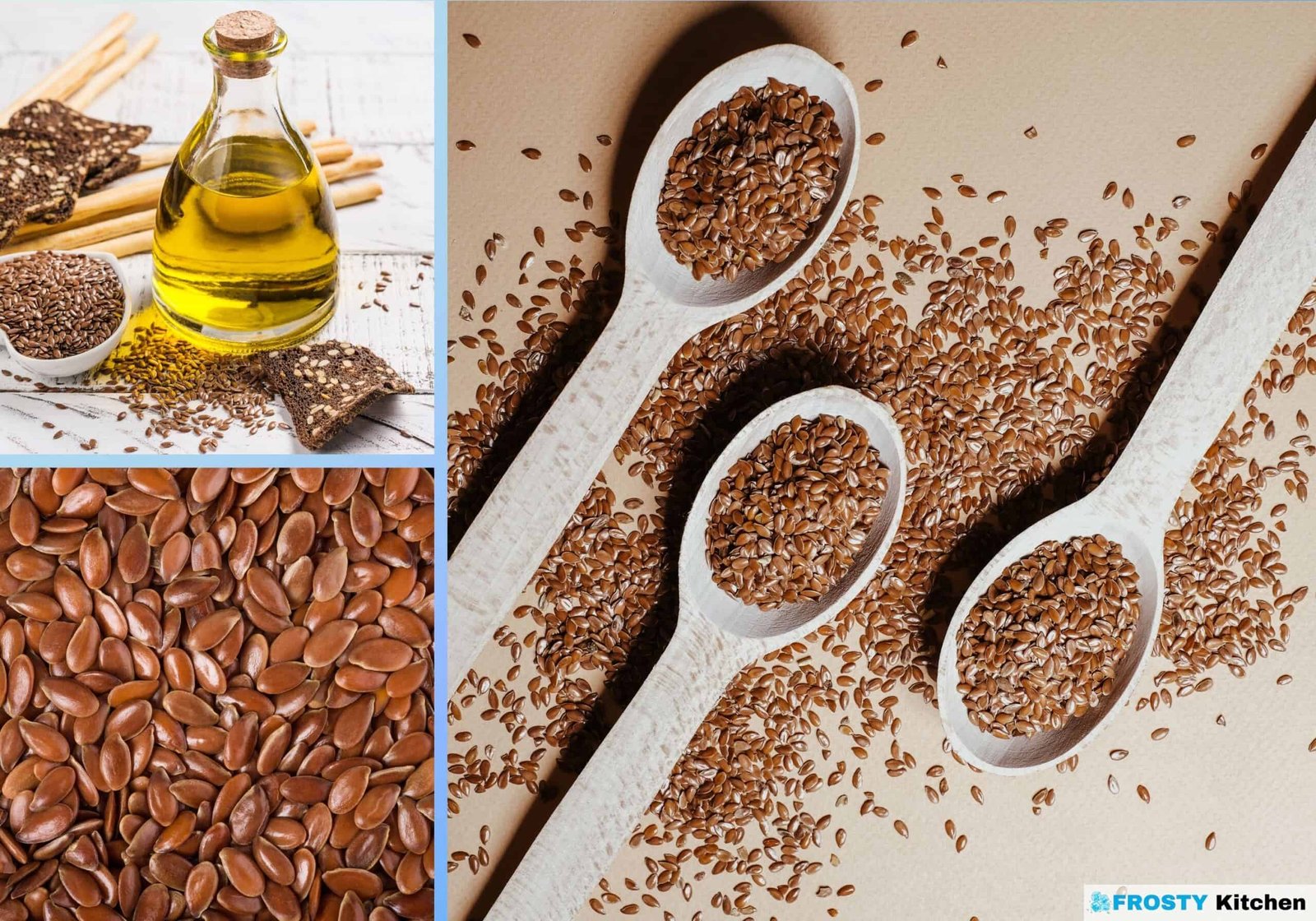Navigating the realms of preserving the nutty goodness of flax seeds is akin to embarking on a journey of nutritional wisdom. Your health-conscious endeavors deserve a reliable guide to ensure the rich profile of Omega-3 fatty acids in flax seeds is well-preserved. This guide is crafted to be your ally in this venture, ensuring you have ready access to this nutritional powerhouse whenever your meals call for a healthy boost.
Flax seeds, known for their nutty flavor and a myriad of health benefits, have garnered a revered spot in the health community. Their historical use and versatile application in modern cuisine are a testament to their enduring appeal.
With every section you explore in this guide, you’re not only learning the art of freezing flax seeds but also immersing yourself in its historical significance, nutritional essence, and the wellness it promises. Let’s unravel this nutritional narrative together!
What is Flax Seeds?
Flax seeds are small, brown, or golden seeds known for their high content of omega-3 fatty acids, lignans, and fiber.
Origin and History
- Flax seeds have a rich history dating back to 3000 BC in Babylon. Their health benefits were recognized early on, and they became a staple in various ancient cultures.
- The versatility of flax seeds, both as a nutritional and a functional ingredient, has made them a cherished item through the ages.
Nutritional Value
- Flax seeds are celebrated for their omega-3 fatty acids which are known for promoting heart health. They are also a rich source of dietary fiber, promoting digestive wellness.
- Furthermore, the presence of lignans in flax seeds provides antioxidant properties, supporting overall health and potentially reducing the risk of certain diseases.
Benefits of Freezing Flax Seeds
- Preservation of Nutritional Profile: Freezing flax seeds helps retain their nutritional profile, ensuring a fresh supply of omega-3 fatty acids, fiber, and other nutrients.
- Extended Shelf Life: Freezing extends the shelf life of flax seeds, allowing you to have a steady supply of your health-centric dishes.
- Ease of Use: Frozen flax seeds offer the convenience of use straight from the freezer, simplifying your healthy cooking routine.
Preparing Flax Seeds for Freezing
- Packaging: Utilize airtight, freezer-safe containers or vacuum-sealed bags to keep flax seeds protected from moisture and freezer burn.
- Portioning: Divide flax seeds into usable portions to facilitate easy use post-freezing.

Step-by-Step Guide to Freezing Flax Seeds
The quest for preserving the nutritional bounty of flax seeds finds its answer in the freezing method. The steps delineated below guide you through this simplistic yet effective preservation technique.
Method 1: Freezing Whole Flax Seeds
- Preparation: Ensure flax seeds are clean and dry.
- Storage: Transfer them into airtight containers.
- Freezing: Place the containers in the freezer, ensuring they lay flat for uniform freezing.
Method 2: Freezing Ground Flax Seeds
- Preparation: If you prefer ground flax seeds, grind them to your desired consistency.
- Storage: Transfer the ground flax seeds into airtight containers or bags.
- Freezing: Place the containers or bags in the freezer.
Refreezing Flax Seeds
Refreezing flax seeds is not recommended as it may lead to a loss in nutritional value and can potentially introduce moisture, leading to spoilage.
Moreover, refreezing might significantly diminish the quality of flax seeds. It’s advisable to portion the flax seeds adequately before the initial freezing, thus avoiding the need for refreezing.
Storage Duration and Factors Affecting it
- Duration: Frozen flax seeds can be stored for up to 6 to 12 months, depending on the initial freshness and the storage conditions.
- Storage Containers: Employing airtight containers or vacuum-sealed bags is crucial to prevent freezer burn and maintain the quality of flax seeds.
- Factors: The initial freshness of flax seeds, the method of freezing, and the consistency of the freezing temperature significantly impact the storage duration.
Frequently Asked Questions
Q1: How can I use frozen flax seeds?
- Utilizing frozen flax seeds is a straightforward endeavor. They can be used directly from the freezer without any need for thawing, retaining their nutritional goodness.
- The convenience associated with frozen flax seeds simplifies the cooking process, allowing you to focus on crafting nutritious dishes imbued with the benefits of flax seeds.
Q2: Do flax seeds lose their nutritional value over time?
- Yes, flax seeds can lose their nutritional value over time, especially when exposed to unfavorable conditions like air, light, or moisture. However, freezing significantly slows down this process, preserving its nutritional essence for a longer duration.
- Additionally, storing flax seeds in airtight containers in a cool, dark place can also aid in preserving their nutritional value. The advantage of freezing is unparalleled as it locks in the nutritional goodness, ensuring the flax seeds retain their essence whenever you decide to use them.
Q3: Can I grind flax seeds before freezing?
- Grinding flax seeds before freezing is a practical approach if you plan to use them in ground form. It allows for quicker freezing and thawing, which can be a real-time save during busy cooking sessions.
- However, it’s essential to note that whole flax seeds retain their nutritional value better than ground flax seeds. If you decide to freeze ground flax seeds, ensure they are stored in airtight, freezer-safe containers to minimize exposure to air and other elements that could degrade their quality.

